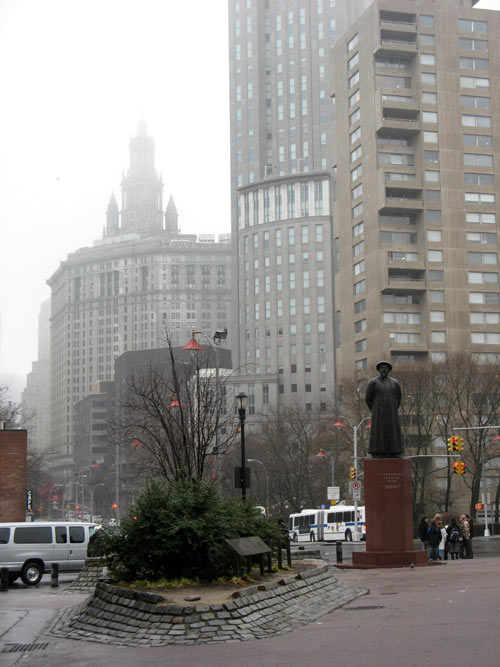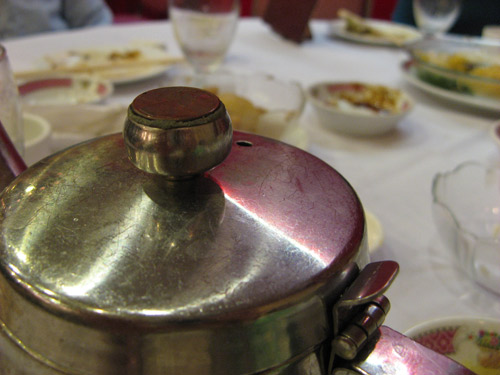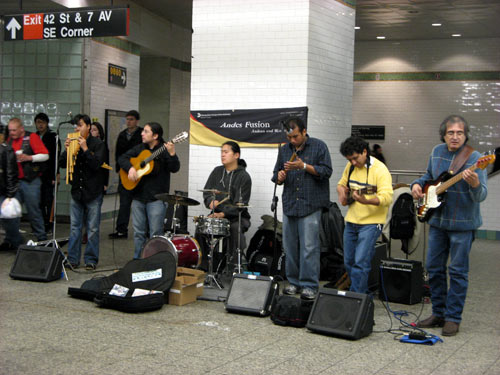Sleep. Brunch. Sleep.
I slept in the first day of 2007 — why not? — but did manage to rouse myself for dimsum in Chinatown by early afternoon. After a flurry of text messages and telephone calls, we (B, SC, JG, CS, MB and I) arranged to meet at Confucius Plaza.
Wait, that’s not Confucius…!
It’s Lin Ze Xu (Li Tse-Hsu), the Fuzhou-native whose statue was erected in 1997 at the intersection of East Broadway and Chatham Square — about a block South of the actual Confucius statue at Confucius Plaza and Division Street. According to The New York Times, the Lin statue cost $200,000, which was financed by individuals and civic associations, in recognition of the area’s growing Fujianese population. The inscription reads: LIN ZE XU, 1785-1850, Pioneer in the War Against Drugs.
But who was this Lin Ze Xu? Lin was an Imperial Commissioner under the Qing (Manchu) Emperor Dao Guang, best known for his role in the events leading up to the Anglo-Chinese Opium War (1839–42). The British East India Company, banned by Chinese law from importing opium into China directly, ran its immensely profitable trade through a series of arrangements via its strongholds in India. Small quantities of opium had been manufactured in China since the late 15th century for the treatment of dysentery, cholera and other diseases. By 1729, the drug was being mixed with tobacco and used for distinctly non-medicinal purposes, prompting the first of many restrictions on opium’s use set in China. By mid-century, the East India Company had assumed control of Bengal and Bihar, the opium-growing districts of India. Within decades, the British managed to establish a monopoly on the opium trade, forbidding all poppy growers in India from selling opium to competitor trading companies, effectively shutting out Britain’s European capitalist rivals, Portugal and Holland. British exports of opium to China skyrocketed from an estimated 15 tons in 1730, to 75 tons in 1773. By the 1820s, the opium trade averaged 900 tons per year from Bengal to China.
Emperor Dao attempted to suppress the smuggling of opium which was debilitating the country and reversing its formerly favorable balance of trade. In 1838, he appointed Lin to head up the mission to eradicate opium in China. Lin approached the task with patriotic zeal, ordering all foreign traders to surrender their opium, setting up barricades at key ports to block foreign ships carrying opium… even writing a letter to Queen Victoria, entreating her aid to stem the illegal trade.
The volatile situation came to a head on June 3, 1839 when Lin confiscated over 2 million pounds of opium from 22 British ships, and supervised its destruction during a 23-day campaign in Humen, China — a scene immortalized on a 1985 Chinese postage stamp.
The action served to ignite the first of the Opium Wars with Britain. Three years later, China had lost the war and Lin his title. Under the Treaty of Nanking (1842), China paid a huge indemnity, ceded Hong Kong to the British Empire, and opened its ports of Guangzhou, Xiamen, Fuzhou, Ningbo, and Shanghai to British trade and residence.
Lin’s efforts, nonetheless, earned him the distinction as a symbol of moral resistance and patriotism.

Dimsum at East Broadway’s Nice Restaurant was a tasty retread of Christmas Day’s meal, with the addition of seafood pan fried noodles (and doufu fa!), and the omission of pig’s feet stew, much to SC’s disappointment.

SC failed to convince CS to sample the tripe — when she doesn’t even eat pork — but succeeded in piquing my interest in the “World’s Longest Yard Sale,” taking place this year August 2-5 along a 450-mile stretch of Hwy. 127 from Covington, Kentucky to Gadsden, Alabama.
Hmm…

There's 1 comment so far ... Sleep. Brunch. Sleep.
Can you take the Chattanooga choo-choo to the yard sale?
Go for it ...
Search
Popular Tags
Categories
Archive
- July 2010
- July 2009
- January 2009
- November 2008
- September 2008
- August 2008
- July 2008
- June 2008
- May 2008
- April 2008
- March 2008
- February 2008
- January 2008
- December 2007
- November 2007
- October 2007
- September 2007
- August 2007
- July 2007
- June 2007
- May 2007
- April 2007
- March 2007
- February 2007
- January 2007
- December 2006
- November 2006
- October 2006
- September 2006
- August 2006
- July 2006
- June 2006
January 9, 2007